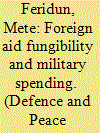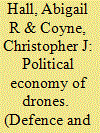| Srl | Item |
| 1 |
ID:
131327


|
|
|
|
|
| Publication |
2014.
|
| Summary/Abstract |
This study presents a framework and models for the analysis of government budget allocation into defense and civilian expenditures in situations of uncertainty about the incidence of war. The models display the intricate relationships between security levels, subjective probabilities of the occurrence of war, and potential war damages. We show that poor countries tend to perceive greater probabilities of war than their richer rivals, and that the psychological burden of insecurity is larger when the country's wealth is larger and when its preference for security is higher. We apply our models to the Israeli-Syrian arms race and show that the higher rate of growth of Israel's gross domestic product relative to that of Syria is expected to lead to an increase in Syria's perception of the likelihood of war and to a decrease in Israel's perception of such a likelihood. We also show that if Syria's regime becomes ideologically more extreme, the monetary cost of maintaining Israel's security at the level that it enjoyed prior to the change will be very high, whereas the monetary cost of maintaining Israel's welfare will be moderate.
|
|
|
|
|
|
|
|
|
|
|
|
|
|
|
|
| 2 |
ID:
131328


|
|
|
|
|
| Publication |
2014.
|
| Summary/Abstract |
Piracy in international waters is on the rise again, in particular off the coast of Somalia. While the dynamic game between pirates, ship-owners, insurance firms and the military seems to have reached some kind of equilibrium, piracy risks generating significant negative externalities to third parties (e.g. in terms of environmental hazards and terrorism), justifying attempts to contain it. We argue that these attempts may benefit from a look back - through the analytical lens of rational choice theory - to the most successful counterpiracy campaign ever undertaken, namely, the one led by the Roman general Gnaeus Pompeius Magnus (Pompey the Great) in 67 BC.
|
|
|
|
|
|
|
|
|
|
|
|
|
|
|
|
| 3 |
ID:
131329


|
|
|
|
|
| Publication |
2014.
|
| Summary/Abstract |
The present article examines if the foreign aid to North Cyprus is fungible and if it is in a long-run equilibrium relationship with military spending using the Autoregressive Distributed Lag bounds testing procedure from 1977 to 2007. The results suggest that neither tax revenues nor public expenditures are in a long-run equilibrium relationship with foreign aid. However, strong evidence emerges that defence expenditures are in a long-run equilibrium relationship with foreign aid, and that the latter seem to cause the former.
|
|
|
|
|
|
|
|
|
|
|
|
|
|
|
|
| 4 |
ID:
131326


|
|
|
|
|
| Publication |
2014.
|
| Summary/Abstract |
This paper provides a political economy analysis of the evolution of unmanned aerial vehicles (UAV), or 'drones' in the USA. Focus is placed on the interplay between the polity and private economic influences, and their impact on the trajectory of political, economic, and military outcomes. We identify the initial formation of the drone industry, trace how the initial relationships between the military and the private sector expanded over time, and discuss present relationships. Understanding the historical evolution of UAV technology, as well as the major players in the industry today, is important for ongoing policy debates regarding the use of drones both domestically and internationally.
|
|
|
|
|
|
|
|
|
|
|
|
|
|
|
|
| 5 |
ID:
131330


|
|
|
|
|
| Publication |
2014.
|
| Summary/Abstract |
Pakistan with highest number of terrorism related deaths of any country over the past decade, the number exceeding the total terrorism related deaths for both the European and North American continents, provides an ideal laboratory to study impact of terrorism on the macroeconomy. Quasi-Structural VAR, Vector Error Correction Model, Impulse Response Functions and Granger-Causality tests on a sample that covers over 4500 terrorist incidents and consequent 10, 200 deaths [from 1973 to 2010] are employed to study the relationship between terrorism and the macroeconomy. One of the major advantages of the current methodology is that it not only enables one to circumvent the heterogeneity biases inherent in cross-country studies but it also allows distinguishing between short and long-run effects. It is documented that cumulatively terrorism has cost Pakistan around 33.02% of its real national income i.e. terrorism costs Pakistan around 1% of real GDP per capita growth every year
|
|
|
|
|
|
|
|
|
|
|
|
|
|
|
|